
Afrobeat is a Nigerian music genre that involves the combination of West African musical styles and American funk, jazz, and soul influences, with a focus on chanted vocals, complex intersecting rhythms, and percussion. The style was pioneered in the 1960s by Nigerian multi-instrumentalist and bandleader Fela Kuti, who is responsible for popularizing the style both within and outside Nigeria.

Fela Aníkúlápó Kuti, also known as Abami Eda, was a Nigerian musician, bandleader, composer, political activist, and Pan-Africanist. He is regarded as the pioneer of Afrobeat, an African music genre that combines West African music with American funk and jazz. At the height of his popularity, he was referred to as one of Africa's most "challenging and charismatic music performers". AllMusic described him as a musical and sociopolitical voice of international significance.

Olufela Olufemi Anikulapo Kuti, popularly known as Femi Kuti, is a Nigerian musician born in London and raised in Lagos. He is the eldest son of Afrobeat pioneer Fela Kuti and a grandchild of political campaigner, women's rights activist and traditional aristocrat Funmilayo Ransome-Kuti.
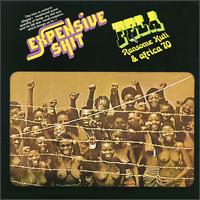
Expensive Shit is the twelfth full-length album by pioneering Afrobeat artist Fela Kuti and his Africa '70 band, released in 1975. It was reissued in 2000 by MCA Records, packaged with Kuti's He Miss Road (1975) on the same CD.

Zombie is a studio album by Nigerian Afrobeat musician Fela Kuti. It was released in Nigeria by Coconut Records in 1976, and in the United Kingdom by Creole Records in 1977.

The Best Best of Fela Kuti is a 2-CD compilation album by Nigerian Afrobeat artist Fela Kuti, released in 1999 by MCA Records. It was issued in the United States in 2000 as part of a reissue series of Kuti's albums. The album was reissued as The Best of the Black President in 2009 by Knitting Factory Records and received universal acclaim from music critics. A companion 2-CD compilation, also released in 1999, was reissued in the U.S. in 2013 by Knitting Factory as The Best of the Black President 2.

Knitting Factory Records is an independent American music label that is notable for promoting a variety of artists, including the music of deceased Nigerian political activist Fela Kuti. The label promotes a variety of music artists including Ages and Ages, Ash Black Bufflo, Cuong Vu, Graham Haynes, Femi Kuti, Gary Lucas, Lumerians, Thomas Chapin, Patrolled By Radar, Joe Morris, Rachid Taha, Seun Kuti, and Shilpa Ray and her Happy Hookers.
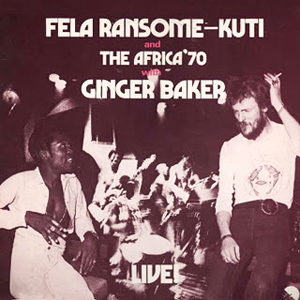
Live! is an album recorded in 1971 by Fela Kuti's band Africa '70, with the addition of former Cream drummer Ginger Baker on two songs. It was released in 1971 by EMI in Africa and Europe and by Capitol/EMI in the United States and Canada. It was reissued on CD by Celluloid in 1987 and was reissued on CD in remastered form by Barclay with a bonus track from 1978.

Oluseun Anikulapo Kuti, who is called by the name Seun Kuti, is a Nigerian musician, singer and the youngest son of the famous Afrobeat pioneer, Fela Kuti. Seun leads his father's former band Egypt 80.
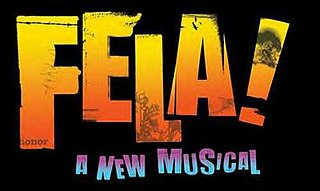
Fela! is a jukebox musical with a book by Bill T. Jones and Jim Lewis, based on music and lyrics by the late Nigerian singer Fela Kuti, with additional music by Aaron Johnson and Jordan McLean and additional lyrics by Jim Lewis. It is based on events in the life of groundbreaking Nigerian composer and activist Fela Anikulapo Kuti. It portrays Kuti in the days when he was the target of 1,000 government soldiers assigned to end his public performances at the legendary Lagos nightclub The Shrine.
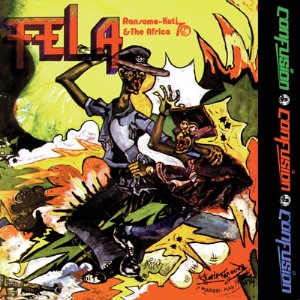
Confusion is a 1975 album by Nigerian Afrobeat musician Fela Kuti and his Africa 70 band. It was arranged, composed, and produced by Kuti, who recorded the album after choosing to emphasize his African heritage and nationalism in his music. Confusion is a commentary on the confused state of post-colonial Lagos and its lack of infrastructure and proper leadership at the time. Kuti's pidgin English lyrics depict difficult conditions in the city, including a frenetic, multilingual trading market and inextricable traffic jams in Lagos' major intersections.
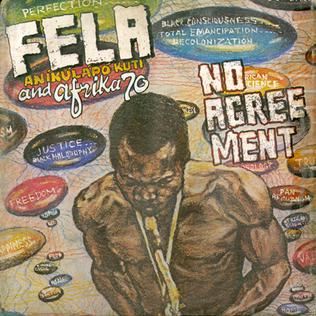
No Agreement is an album by Nigerian Afrobeat composer, bandleader, and multi-instrumentalist Fela Kuti, recorded in 1977 and originally released on the Nigerian Decca label.

Sorrow Tears and Blood is an album by Nigerian Afrobeat composer, bandleader, and multi-instrumentalist Fela Kuti recorded in 1977 and originally released on the Nigerian Kalakuta label.

Shuffering and Shmiling is an album by Nigerian Afrobeat composer, bandleader, and multi-instrumentalist Fela Kuti, recorded in 1977 and originally released on the Nigerian Coconut label.

Why Black Man Dey Suffer is an album by Nigerian Afrobeat composer, bandleader, and multi-instrumentalist Fela Kuti recorded in 1971 and originally released on the Nigerian African Sounds label after EMI refused to release it.

Fela's London Scene is an album by Nigerian Afrobeat composer, bandleader, and multi-instrumentalist Fela Kuti, recorded in England in 1971 and originally released on the Nigerian EMI label.

Shakara is an album by Nigerian Afrobeat composer, bandleader, and multi-instrumentalist Fela Kuti, recorded in Lagos in 1971 and originally released on the Nigerian EMI label.

Roforofo Fight is an album by Nigerian Afrobeat composer, bandleader, and multi-instrumentalist Fela Kuti recorded in Lagos and originally released on the Nigerian EMI label Jofabro in 1972.

Afrodisiac is an album by Nigerian Afrobeat composer, bandleader, and multi-instrumentalist Fela Kuti, originally released on the Nigerian EMI label in 1973. The album's four tracks were re-recordings of Nigerian 45s redone in London in 1972. The album features Kuti's first Nigerian hit "Jeun Ko Ku," which sold over 200,000 copies.
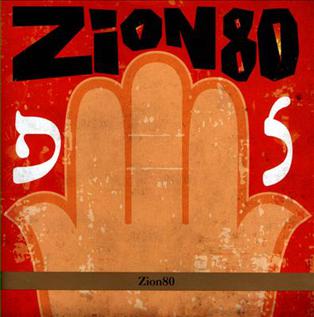
Zion80 is the debut album by guitarist Jon Madof's Zion80 which was released in 2013 on John Zorn's Tzadik Records as part the Radical Jewish Culture series. The album combines music written by Shlomo Carlebach performed in the Afrobeat style of Fela Kuti.




















